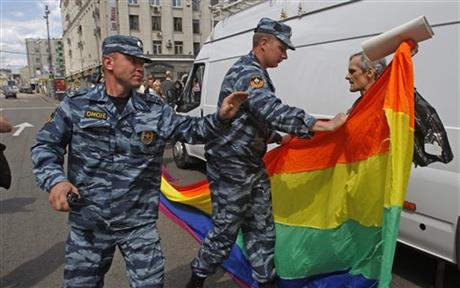Kirit Radia
ABC News
July 31, 2013
In Russia it is now illegal to even speak about homosexuality around minors, much less openly display gay pride. Technically the ban is against “propaganda of nontraditional sexual relations” around minors, but the implication for openly gay individuals is clear. Public displays of affection by gays, including holding hands or displaying symbols like a rainbow flag, are now banned. Violators face steep fines and jail time; foreigners face similar penalties plus deportation.
So what will happen to openly gay athletes and fans, as well as any vocal supporters or protestors, when Russia hosts the Winter Olympics next year in Sochi?
This week, comments by a lawmaker from St. Petersburg set off a firestorm online when he said that fans and athletes would not be immune from prosecution during the games.
Vitaly Milonov, who sponsored legislation in St. Petersburg last year that became the basis for a national law signed by President Vladimir Putin in June, was quoted telling the Interfax news agency that the law will remain in place during the Olympics and will be applied to foreigners.
“If a law has been approved by the federal legislature and signed by the president, then the government has no right to suspend it. It doesn’t have the authority,” he reportedly said, stressing that he has not heard anything different from Russian officials.
It is worth noting, however, that Milonov is only a regional lawmaker and is not a member of the federal government or the national legislature. But he has been on the forefront of Russia’s war against homosexuality. Last summer he threatened to fine pop star Madonna for violating the law after she spoke out against it from the stage during a concert in St. Petersburg.
The International Olympic Committee appears only cautiously optimistic that the games will be safe for gay athletes and fans, noting that it has sought assurances from Russian authorities.

